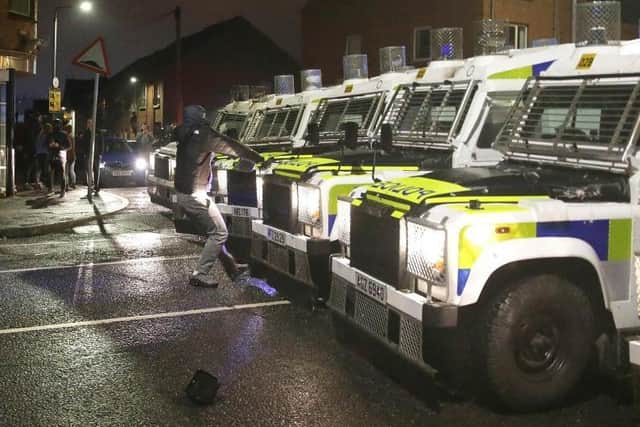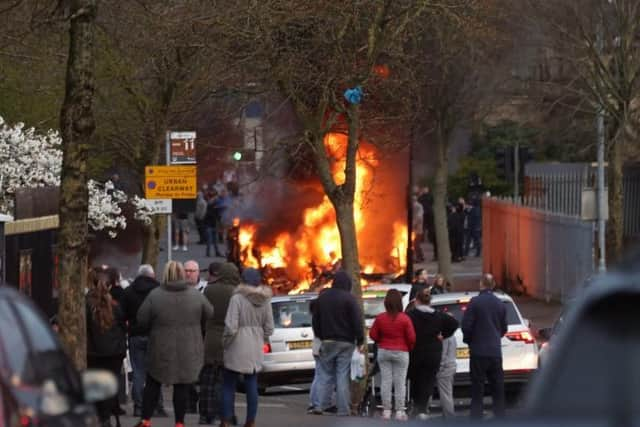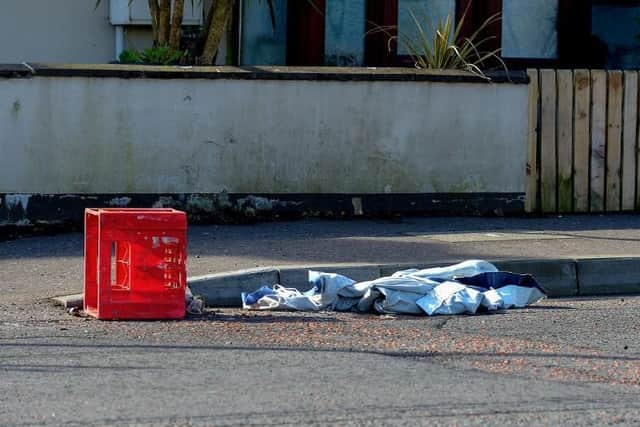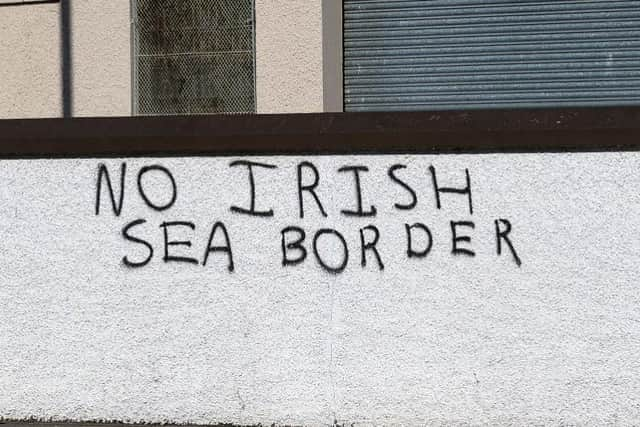Terry Wright: The people who were told NI was a special place do not feel very special
and live on Freeview channel 276
Why does this change in the political arena where there is little willingness to move beyond the fixed position?
If what we see at Stormont is ‘doing their best’; spare us the worst. If it was a sports pitch, we have parties and individuals attempting to play private games of Gaelic football, hurling, rugby, football and hockey at the same time; all to their preferred rules with a few passive observers thrown in.
Advertisement
Hide AdAdvertisement
Hide AdThere is a pressing need, as evidence mounts within communities, to rid ourselves of what has become a forum for binary and sustained political narcissism. Either the politicians change; the voters change the politicians or the political structures need review.


The ugly scaffolding has delivered ugly politics; acting as a rocking horse with plenty of motion but showing minimal capacity to move beyond entrenchment.
Sanitised as a peace process it presents more as zero-sum opportunism designed to deliver incremental gains for the side which can exploit the most leverage from disruption and institutionalised attrition.
Advertisement
Hide AdAdvertisement
Hide AdWhen it works for your agenda, it is fine but if it is seen as producing for your opposition, it is condemned without any sense of irony: “If 60% of people do not want a border on the island, and you say ‘tough shit, we are putting you inside a hard border,’ you cannot expect people to just choke that down and get on with their lives,” Claire Hanna, Member of the Northern Ireland Legislative Assembly for the Social Democratic and Labour Party told Business Insider.


“You cannot imagine that people would take that without civil disobedience at a very minimum.”
There has been no such rationale for the disturbances in South Belfast on this occasion. Different tribe, different cause. The violent and ultimately counter-productive disturbances seen on the streets of Londonderry, Newtownabbey, Carrickfergus and South Belfast have a number of causes.
Resentment and unease have been building up within constituencies for some time.
Advertisement
Hide AdAdvertisement
Hide Ad

In January 2021, community workers in numerous areas spoke of this but felt that whilst there was a mood for protest ‘wiser heads’ were acting to ‘keep a lid’ on the tension and allow politics to work especially with pandemic figures rising. In recent days, the violence could have been more widespread if these individuals were not being listened to in some areas.
The issues and reactions were not the same in all areas but there are common threads. In East Londonderry, one seasoned community activist spoke of fear, concern, uncertainty and a sense of betrayal with regard to the future.
He referred to feelings that the hypothetical threat of violence over a border on the island reinforced a strong perception that ‘violence and the threat of violence brings its rewards.’
Advertisement
Hide AdAdvertisement
Hide AdHe further added: “The NI Protocol and the establishment of an Irish Sea Border with its constitutional and economic implications are seen as the outcome of a common aim of the EU, Dublin and northern nationalism to use the Good Friday Agreement as cover for a preferred and exclusive outcome with Northern Ireland marginalised as the collateral damage. To get Brexit done, Westminster complied.


This is not what Unionists who voted for Brexit or supported Remain voted for. Trade is not unfettered and our access to the UK Internal Market is already limited. What will it be like when the grace period ends?”
Since January other issues have acted to take tension into overload. The threat by the EU to activate Article 16 focused minds very quickly on what was possible with Northern Ireland standing by helplessly.
Advertisement
Hide AdAdvertisement
Hide AdThe very vocal stance of new American President Joseph Biden in displaying a somewhat green-hued approach to Northern Ireland politics, scarcely hidden hostility towards the NI Centenary in Derry and elsewhere, calls for preparation for a referendum on Irish Unity with no evidence of a groundswell for one to take place and a perceived imbalance over legacy issues with enquiries granted in some high-profile instances, yet denied in others, have all served to heighten tension.
The EU’s threat over vaccines and the PPS ruling over the Bobby Storey funeral have provoked the civil disturbances with people feeling their voice is ignored; that everyone is not equal before the law. The people who were told that Northern Ireland was a special case do not feel very special.
This does not make the actions justifiable or excuse them but they have to be understood and ended. The dynamic of civil disturbances vary in different locations and local issues are often part of the mix.
Advertisement
Hide AdAdvertisement
Hide AdRecreational rioting is a euphemism for anti-social and lawless behaviour; paramilitary groups can instigate them to send out a diversionary message but it would be a mistake to contend that these offer a full explanation for what is happening.
When parents, standing outside their homes ignore the pleas of a DUP Councillor in Londonderry to stop their young people from attacking the police in order to avoid arrest and getting a criminal record and is told in industrial language where to go and there is no sympathy for the police on the frontline, there are deep-seated problems which politics is not reaching and maybe exacerbating.
The attitude on display is not merely shaped by political rhetoric, as claimed, for the politicians are ignored and dissatisfaction with politicians has set in.
In a recent report published by the Londonderry Bands Forum and yet to be fully analysed, one of the areas where a range of data was gathered has been the scene of recent violence. It is too soon to draw conclusions but some of the initial findings may at least table issues and provide focus.
Advertisement
Hide AdAdvertisement
Hide AdSectarianism and a sense of communal alienation within Derry has declined and there is greater willingness to travel into the centre and mix with individuals who may be seen as coming from a different religious or political background. This is supported in various ways throughout the report and tends to point to the disturbances as having little sectarian context.
However, in response to questioning in focus groups and individually, residents voiced a sense of betrayal and disillusionment with the Good Friday Agreement and a lack of effective voice for their identity and politics. A mere 10% professed themselves satisfied with political representation albeit that, if they vote, they may still vote for the main parties of unionism.
When it came to priorities, issues like mental health, suicide rates, educational attainment, disability, economic opportunities and training were high on the agenda.
Advertisement
Hide AdAdvertisement
Hide AdIn one focus group it was suggested by a speaker that his community is often viewed as the ‘underbelly of society.’ As we have listened to various politicians on the media, read their contributions in the newspapers and words on social media, there have been few, if any, who have avoided the ‘blame game.’
There is little mention of or exercise of devolved responsibility for mental health, education, the economy or disability. Electors interested in these are being disenfranchised as an unseemly squabble grows over who bears responsibility for what, as the cars burn and petrol bombs are launched at targets in uniform.
The parties at Stormont are fond of enquiries which serve their agendas so this time around hold an enquiry into the reasons for the civil unrest. Go into the areas and consult with the communities.
Advertisement
Hide AdAdvertisement
Hide AdIs it to do with policing, the Protocol, the Bobby Storey funeral, disillusionment with the GFA amongst other reasons? Are there underlying social and economic issues to do with education, health, employment and inequality?
It is sometimes suggested that people living in communities where there are cultural and identity tensions only know what they are against and not what they are for. Maybe they do but the politicians are not listening.
People rarely burn and destroy a community in which they feel they have a stake and have a voice.
Is there an imperative presenting to address uncertainty, insecurity and political marginalisation in all its manifestations?
Maybe our politicians can develop a stronger sense of shared purpose. Now that would be the decent thing to do; London, Dublin and Brussels should be encouraged to join in.